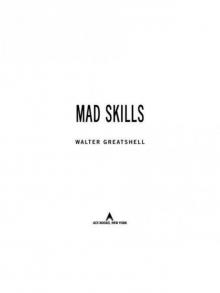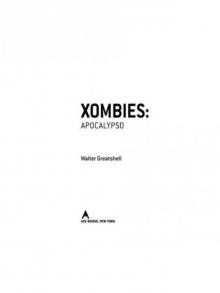- Home
- Greatshell, Walter
Xombies: Apocalypse Blues
Xombies: Apocalypse Blues Read online
Table of Contents
Title Page
Copyright Page
Acknowledgements
CHAPTER ONE
CHAPTER TWO
CHAPTER THREE
CHAPTER FOUR
CHAPTER FIVE
CHAPTER SIX
CHAPTER SEVEN
CHAPTER EIGHT
CHAPTER NINE
CHAPTER TEN
CHAPTER ELEVEN
CHAPTER TWELVE
CHAPTER THIRTEEN
CHAPTER FOURTEEN
CHAPTER FIFTEEN
CHAPTER SIXTEEN
CHAPTER SEVENTEEN
CHAPTER EIGHTEEN
CHAPTER NINETEEN
CHAPTER TWENTY
CHAPTER TWENTY-ONE
CHAPTER TWENTY-TWO
CHAPTER TWENTY-THREE
CHAPTER TWENTY-FOUR
CHAPTER TWENTY-FIVE
CHAPTER TWENTY-SIX
CHAPTER TWENTY-SEVEN
CHAPTER TWENTY-EIGHT
CHAPTER TWENTY-NINE
CHAPTER THIRTY
EPILOGUE
TURN THE PAGE FOR A SPECIAL PREVIEW OF WALTER GREATSHELL’S NEXT NOVEL XOMBIES: ...
ABOUT THE AUTHOR
“The writing is fast paced and keeps you hooked. The book itself is a cross of Night of the Living Dead and an end-of-the-world-type premise that you would find in books like George Stewart’s Earth Abides.”—Roundtable Reviews
“Surprise after surprise. A heady brew of horror, science fiction, suspense, and adventure . . . as sharp and bone-chilling as an arctic gale.”—A. J. Matthews, author of Unbroken
“A triumph, both epic in scope and entirely unpredictable, and anchored by one of the most refreshing and unique voices in modern fiction.”—Nate Kenyon, author of The Bone Factory
“An amazing novel . . . It’s really, really good.” —Bob Fingerman, author of Bottomfeeder
“This book has it all: action, excitement, a subtle love story, a bit of comedy, and even a really cool part where the story is told from the point of view of a zombie for a few chapters. The book is even left open for a sequel. I’ll keep my fingers crossed.”—Dead Lantern
“Greatshell’s book is just as much science fiction as it is horror, and he creatively blends [the] two genres together. Greatshell does a great job of developing Lulu as a character, and his strong writing makes this an enjoyable apocalyptic tale.” —Monster Librarian
“Well paced . . . The story unfolds with plenty happening and some genuinely shocking scenes.”—Zombies Outside.com
THE BERKLEY PUBLISHING GROUP
Published by the Penguin Group
Penguin Group (USA) Inc.
375 Hudson Street, New York, New York 10014, USA
Penguin Group (Canada), 90 Eglinton Avenue East, Suite 700, Toronto, Ontario M4P 2Y3, Canada
(a division of Pearson Penguin Canada Inc.)
Penguin Books Ltd., 80 Strand, London WC2R 0RL, England
Penguin Group Ireland, 25 St. Stephen’s Green, Dublin 2, Ireland (a division of Penguin Books Ltd.)
Penguin Group (Australia), 250 Camberwell Road, Camberwell, Victoria 3124, Australia
(a division of Pearson Australia Group Pty. Ltd.)
Penguin Books India Pvt. Ltd., 11 Community Centre, Panchsheel Park, New Delhi—110 017, India
Penguin Group (NZ), 67 Apollo Drive, Rosedale, North Shore 0632, New Zealand
(a division of Pearson New Zealand Ltd.)
Penguin Books (South Africa) (Pty.) Ltd., 24 Sturdee Avenue, Rosebank, Johannesburg 2196,
South Africa
Penguin Books Ltd., Registered Offices: 80 Strand, London WC2R 0RL, England
Originally published in a slightly different form as Xombies.
This is a work of fiction. Names, characters, places, and incidents either are the product of the author’s
imagination or are used fictitiously, and any resemblance to actual persons, living or dead, business
establishments, events, or locales is entirely coincidental. The publisher does not have any control
over and does not assume any responsibility for author or third-party websites or their content.
XOMBIES: APOCALYPSE BLUES
An Ace Book / published by arrangement with the author
PRINTING HISTORY
Berkley mass-market edition / August 2004
Ace mass-market edition / October 2009
Copyright © 2004 by Walter Greatshell.
All rights reserved.
No part of this book may be reproduced, scanned, or distributed in any printed or electronic form
without permission. Please do not participate in or encourage piracy of copyrighted materials in
violation of the author’s rights. Purchase only authorized editions.
For information, address: The Berkley Publishing Group,
a division of Penguin Group (USA) Inc.,
375 Hudson Street, New York, New York 10014.
eISBN : 978-1-101-14057-4
ACE
Ace Books are published by The Berkley Publishing Group,
a division of Penguin Group (USA) Inc.,
375 Hudson Street, New York, New York 10014.
ACE and the “A” design are trademarks of Penguin Group (USA) Inc.
http://us.penguingroup.com
ACK NOW LE DGMENTS
Thanks to my agent, Laurie McLean; my editor, Danielle Stockley; and Berkley veep, Susan Allison, whose belief in resurrecting the dead made it all possible. In fact, kudos to everyone at Berkley and Ace—any flubs herein are mine, not theirs.
Finally, my greatest shout-out must go to my wife, Cindy, for never letting me forget that this was not only possible but inevitable. As ever, this book is for her.
My name is Louise Alaric Pangloss, I am seventeen years old, and I suffer from chromosomal primary amenorrhea. I am not in the habit of announcing that to the world, but there is so little of the world left now that it scarcely matters what I say. I am very slight of build—that is to say, flat as a board—and frequently mistaken for a girl half my age. In part this is due to my neotenic, waiflike features; but in the past it was also a product of my wardrobe, which over the years had become an increasingly specific costume calculated to elicit sympathy from bill collectors, truant officers, social workers, and other bureaucratic functionaries. It consisted of a plush green velvet dress and bodice, with a lace collar, puffy-sleeved blouse, white knee-length stockings, and shiny Buster Browns. With my milk white skin, wide-set amber eyes, and pigtailed black hair, these elements combined to create an archetype of Edwardian innocence, which my mother was only too happy to wield like a voodoo doll. The effect was especially brutal if I feigned tears or affected a British accent. I should say that out of costume I was not a particularly adorable child. At one elementary school I was nicknamed “the alien” because of my supposed resemblance to the little gray men of UFO lore; at another I was “Lucy,” after the prickly Peanuts character.
How I came to be lying in state, under glass, with a procession of men and boys paying their respects to my magnificently preserved body—and all of this taking place aboard an Ohio-class nuclear submarine—is the basis for the story I am about to tell. It is the only known record of these events.
CHAPTER ONE
My mother and I missed the news about Agent X because we spent most of that January cooped up in a beach bungalow outside Jerusalem, Rhode Island. Prior to that we had been living in Providence, stalking an elderly man Mum had tracked all the way from Anaheim, California—a man she contended was my father. I found her crusade embarrassing and pointless: If she had been foolish enough to get knocked up by an old goat who ran off the first chance he
got, it was more an expression of her character than his. Having lived with her for seventeen years, I knew all too well what a pain in the ass she was. The guy had my sympathy.
When we began leafleting his Pawtucket neighborhood, the codger spooked and fled to his summer cottage by the sea.
“You can’t get away from me that easily,” Mum muttered nefariously, late into the night. “Oh no, buster. If that’s what you think, you got another think coming. Yes indeedy.” We had to pack up and leave our little Gano Street apartment during the wee hours of the morning, a drill I was quite familiar with after a lifetime of covert maneuvers.
“Isn’t this fun?” Mum said breathlessly as we loaded the sputtering Corolla. Her eyes were bright and wild. It was cold.
“Oh, sure,” I said. “What am I supposed to do with my bike?” I had just gotten it for Christmas—a new Huffy.
“Just leave it chained under the stairs, honey. We’ll get it later.”
That was the thing about her: She knew we would never set foot within a mile of this place again, not with all the back rent and utility bills we owed. Caches of our abandoned pets and possessions stretched from coast to coast, and she acted as if someday we would follow it all home like a trail of bread crumbs. Did she even realize we were butting up against the far side of North America? The only place left to run was the Atlantic Ocean.
In reply to my grinding contempt, she said, “Come on, sourpuss! It’s an adventure! Show a little spirit!”
It wasn’t hard to find off-season rentals in summer resorts. Owners of such properties were usually so happy to have winter tenants that they made no bones about leases, first and last, background, or credit histories. Add to that the discount rates, few nosy neighbors, and attractive, out-of-the-way locations that tended to discourage process servers, and you understand why such accommodations were a staple of ours. Poor old Mr. Fred Cowper had no idea that by retreating to the seaside, he’d all but put out the welcome mat.
Mum soon had us in a treeless village of white clapboard cottages strewn like apple crates across a grassy common. Bare clotheslines and backyard LPG tanks made up the view. It looked like a mining camp during the Gold Rush, or at least the abandoned remains of one. The sea wasn’t exactly at our doorstep, but you could smell rotten eggs when the tide went out, and to me that meant clams, oysters, and other littoral delights, of which I was an avid hunter ever since reading Stalking the Blue-Eyed Scallop, by Euell Gibbons. (Over the years, I had practically memorized the book, and still felt a guilty twinge every time I read the words PROPERTY OF OLIVER LAFARGE PUBLIC LIBRARY.) Aside from a few seldom-seen retirees like Cowper, and a house down the road occupied by hard-partying biker types, the place was a ghost town.
We didn’t have a TV or a radio, not even in our car, because my mother couldn’t bear commercials of any kind, and most popular music disturbed her chi. Instead, we relied on an old Capehart record player and her collection of movie-soundtrack albums, so that my childhood memories are all scored by Henry Mancini. Mum painted watercolor still lifes, and I wrote poetry in the style of Emily Dickinson, whom I identified with to a nearly pathological degree. Consequently, by the time we heard what was going on, it was already old news. Here is what happened:
It was the first week of the month, and Mum had gone to our P.O. box in Providence to retrieve and cash the interest check from my trust fund. This was money left for my care by her father, and it galled her no end that she had no control over the principal, which would be mine when I turned eighteen. For a period of several years she actually contested his will, an Ahab-like quest that almost drove her mad. Mum’s ever-changing, grandiose plans for that money made me glad she couldn’t get at it, though the shopping binge would have been fun. As it was, we had just enough to live on three weeks out of the month and ran up debts in the fourth.
On that particular fourth week, we had been subsisting on pancake mix, basmati rice, and whatever I could forage from the ocean, so I was looking forward to unpacking a carload of groceries and all the magazines we subscribed to. After weeks of picking over old ones, new magazines were like fresh meat. But I knew something was wrong when I didn’t hear her get out of the car. The engine stopped, and she just sat there, as if formulating another bogus tale—I knew at once she had blown the money, or been conned out of it. Something. My bird chest constricted, and my eyes swam with tears of frustration: Not again.
But when she finally came in, I could tell it was something else. Something new. There were no groceries, and I was determined to be indignant, but the look on her face gave me a feeling I thought I had long outgrown: childish fright—the fright that only comes from seeing adults fall apart.
Clinging for dear life to my petulance, I demanded, “What happened?”
“Honey?” Her look was dreamy, detached. Unbalanced. “Something weird is going on.”
“What? Shut the door, it’s freezing in here.”
“Lulu . . .”
I avoided looking at her. “What?” I said. “What’s wrong?”
“I couldn’t check the mail. Everything’s blocked off.”
“What do you mean? Why?” I thought she meant there had been road construction or an accident. That was it: She must have seen a terrible accident. Such things had disturbed her before. Once we passed a bad wreck while riding the bus, and she covered her eyes and moaned, “Oh, oh, oh,” for long minutes, while the other passengers stared at us, and I tried to reassure her that the body under the bloody sheet was only covered up “to keep the sun off him” and that “I swore I saw him move.”
Creepily blank, she said, “There’s nobody out there. I couldn’t even get to the highway. Traffic was all jammed up.”
“I don’t get it. There’s nobody where?”
“Anywhere.”
Growing impatient, I said, “You just said there was a lot of traffic.”
“Yes.” She looked at me, slowly nodding. I could see that she was vibrating like a scared kitten. As if correcting a preschooler, she said, “The cars are all abandoned, sweetie. They were all just left in the road.”
I felt a twinge. “Give me a break,” I said, annoyed by my own reaction. “You’re just having an anxiety attack.”
She seemed to catch her breath and get centered. Focusing on me in the hyperearnest way she knew I disliked, she said, “Lulu, honey, I don’t mean to scare you. Dammit, sometimes I forget you’re only seventeen. But I promise you I won’t let anything happen to you. I know the last couple of years have been difficult, but this is different. This is not a hot flash.”
I was completely lost, could only shrug helplessly.
“I stopped at the gas station on Route 1,” she said. “There was no one there, but I found this.” She set down her big Gua temalan bag and pulled out a Hello Kitty portable radio. “I also found cartons of army rations, MREs—they’re in the trunk. All kinds of things were just lying around loose, and I started wandering the street trying to find someone. All I could think was terrorists, you know, maybe a bomb scare or something, and I thought we should know what to do. I couldn’t find a soul. Then I got the bright idea to try the radio”—she shook her head, chewing on air for a second—“and, and I thought it was a prank or something. April Fools’ Day. Only it’s not.” Her teeth had started chattering.
My scalp bristled. “What? Mum, you’re freaking me out!”
“They say if we just stay out of sight, we’re safe . . .”
“Safe from what?”
She stared at me, wildly conflicted, then let it all spill out: “From women, honey. Sick women! It’s called Agent X, but it’s some kind of disease like rabies. It’s a real epidemic. It infects everyone, but it starts with women. They’re out there like—like Typhoid Mary or something, crazy, and if they catch you, you get it. Or you can also catch it from men, once they’ve been infected, but either way we’re not supposed to go outside: ‘Beware any aggressive, unusual, or disheveled-looking people. ’ She giggled hysterically. “
That’s us, isn’t it?”
With that it hit me that my mother had flipped. She was imagining all this, getting lost in some kind of paranoid, psychotic episode. The fear I had been feeling turned inside out and became an entirely different kind of terror, one bound up in pity and loneliness and infantile need. What was I going to do? I was still a minor—what would happen to me? Ward of the state? I had no relatives to take me in, we had no money. I could feel the tears spilling down my cheeks.
“Mum,” I begged. “Come on. It’s okay. It’s going to be okay.” I gingerly took her by the arm. “Come on. Come sit down and rest. You’re okay. See? It’s okay, you just need to take it easy. Everything’s going to be fine . . .”
She was resisting my gentle attempts to pull her.
“What do you think you’re doing?” she erupted at last. “I’m not crazy!” The way she said this—the wry edge to her voice—was so completely normal that it cut through the strangler vines of fear like a machete. I continued to try to lead her by the arm, but my own arms had gone wobbly, and she wouldn’t budge.
“Come on,” I insisted weakly.
“No. Lulu, let go.” Somehow, she caught wind of the loony direction things had taken and cracked a smile.
“What’s so funny?” I said, grinning back against my will. That opened the floodgates, and we were both wracked with weeping laughter, expelling the suffocating fear like bad air. After a few minutes, it died down, and we sat on the nubby orange couch to catch our breaths.
Mum got ahold of herself first. “Honey, I swear I’m not crazy. This is real. I wish it weren’t, but it is.”

 Xombies: Apocalypse Blues
Xombies: Apocalypse Blues Mad Skills
Mad Skills Xombies: Apocalypso
Xombies: Apocalypso